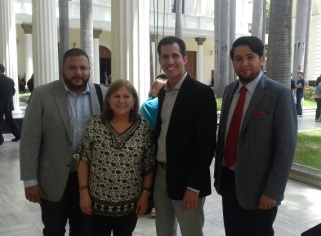
Jun 18, 2016 | Focolare Worldwide
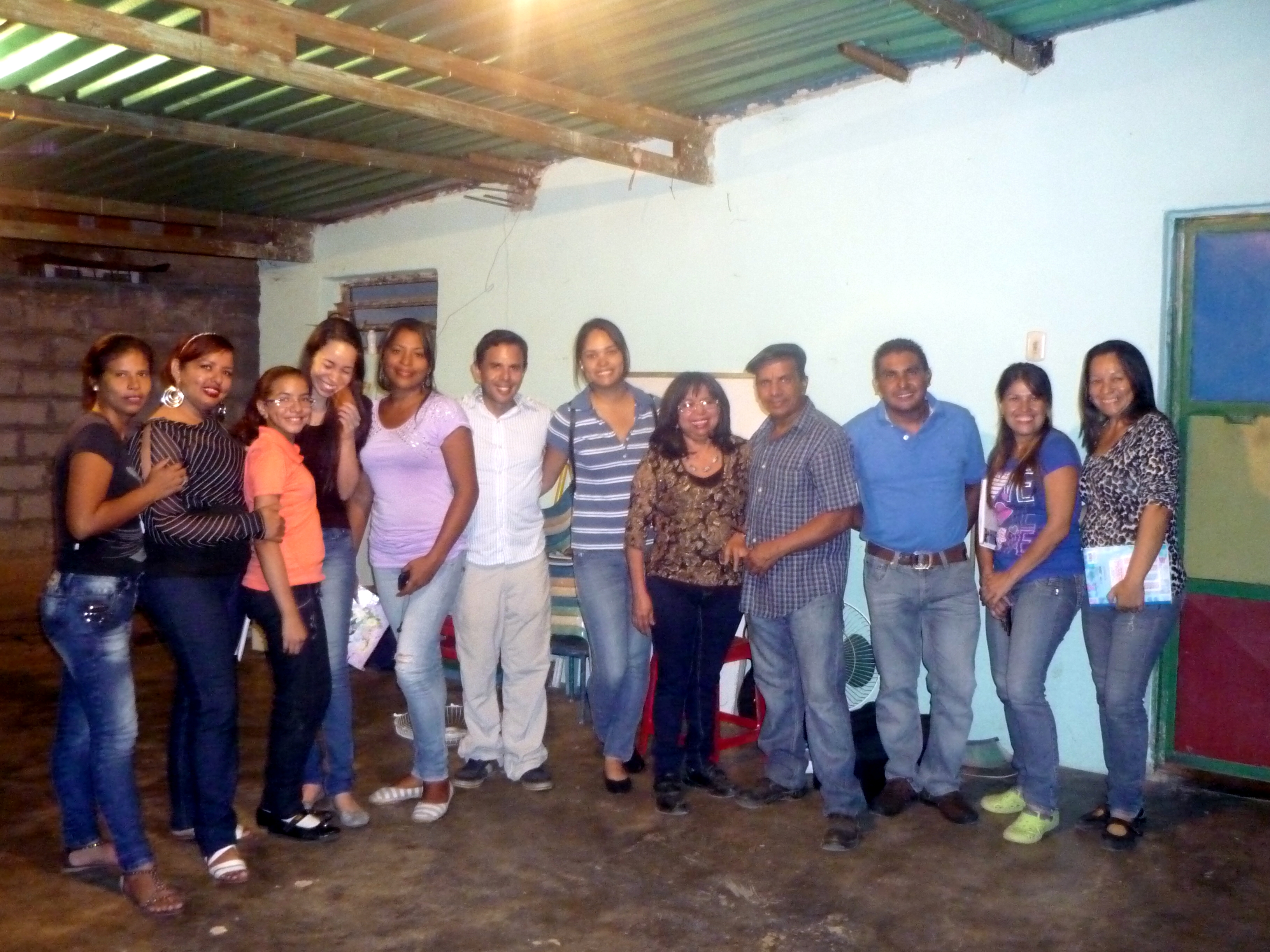 “On my way home,” recounts Ofelia who is from a small district of Valencia, the third largest city of Venezuela, “I saw a couple going home on foot. I slowed down and asked if they wanted a ride. Exhausted and breathless, they got into the car immediately. After getting their breath back they told me that they had awoken very early to go and buy flour and other basic foodstuffs for their kids, but the queue was so long that when their turn came, there was nothing left. Disappointed, they told themselves that the only thing they would return home with was a big headache since they had not had breakfast or lunch.” These painful and unfortunately recurring situations often go unanswered since even Ofelia had nothing to give them. Her purse was empty and she was jobless. The widespread lack of means of livelihood pushed the Focolare community in Venezuela to help one another in all ways. For example, the ladies offer one another hairstyling services and mend old clothes to give to those in need, so as to be neat and orderly despite their poverty, and testify also visibly to the evangelical love they try to live amongst them. “One day,” the head of a family recounted, “I went to buy some food, but there was nothing available and it seemed like everything had disappeared. On doing our rounds I spotted some foruro or toasted maize. We generally do not eat this, but we recalled that one of our friend’s family ate it, and I thought that it was better than nothing. In the afternoon, passing by their home, I dropped by to ask whether they had eaten lunch. The wife said “no, not even breakfast. We have no money and my husband has weakened due to hunger.” I told her that they couldn’t go to bed without eating something, and ran to take the foruro I had bought. That evening for me was really joyful since they were able to have dinner, even if only with just foruro. One day, Laura was stopped by a woman who confided her worries since she could not find the medicine for her hypertension. She herself instead managed to get the drugs through acquaintances from abroad. In times like this, it would be prudent to keep these items for oneself, also because you never know whether you will be able to procure them again. But in the Gospel Jesus said «give and you will receive, and without thinking twice, opened her bag and gave her a whole blister pack of pills.
“On my way home,” recounts Ofelia who is from a small district of Valencia, the third largest city of Venezuela, “I saw a couple going home on foot. I slowed down and asked if they wanted a ride. Exhausted and breathless, they got into the car immediately. After getting their breath back they told me that they had awoken very early to go and buy flour and other basic foodstuffs for their kids, but the queue was so long that when their turn came, there was nothing left. Disappointed, they told themselves that the only thing they would return home with was a big headache since they had not had breakfast or lunch.” These painful and unfortunately recurring situations often go unanswered since even Ofelia had nothing to give them. Her purse was empty and she was jobless. The widespread lack of means of livelihood pushed the Focolare community in Venezuela to help one another in all ways. For example, the ladies offer one another hairstyling services and mend old clothes to give to those in need, so as to be neat and orderly despite their poverty, and testify also visibly to the evangelical love they try to live amongst them. “One day,” the head of a family recounted, “I went to buy some food, but there was nothing available and it seemed like everything had disappeared. On doing our rounds I spotted some foruro or toasted maize. We generally do not eat this, but we recalled that one of our friend’s family ate it, and I thought that it was better than nothing. In the afternoon, passing by their home, I dropped by to ask whether they had eaten lunch. The wife said “no, not even breakfast. We have no money and my husband has weakened due to hunger.” I told her that they couldn’t go to bed without eating something, and ran to take the foruro I had bought. That evening for me was really joyful since they were able to have dinner, even if only with just foruro. One day, Laura was stopped by a woman who confided her worries since she could not find the medicine for her hypertension. She herself instead managed to get the drugs through acquaintances from abroad. In times like this, it would be prudent to keep these items for oneself, also because you never know whether you will be able to procure them again. But in the Gospel Jesus said «give and you will receive, and without thinking twice, opened her bag and gave her a whole blister pack of pills.  In this country’s difficult situation, the visit of Cecilia di Lascio (21-25 May) Argentinean, and regional coordinator of the Political Movement for Unity, was really timely. In Caracas, she had an interesting meeting with 75 people who wanted to commit themselves for the common good, and among whom were various young people: in the hall of the National Assembly she presented the ideal of unity to a group of people who were interested in politics, and before leaving the country held a meeting with a group of university professors on how to educate the youth according to the paradigm of fraternity in the various disciplines of knowledge and human activities. Two important events were also held in the encounter with Dr. Lombardi, of the Cecilio Acosta University, and a meeting with the RUEF (University network of studies on Fraternity) commission. All this contributed to acquiring greater comprehension of the political process taking place in the country. “We have to focus on equity, the central objective and start off from the paradigm of fraternity,” Dr Lascio affirmed in her various speeches. “In this difficult situation I firmly believe in the importance of working together for the common good.”
In this country’s difficult situation, the visit of Cecilia di Lascio (21-25 May) Argentinean, and regional coordinator of the Political Movement for Unity, was really timely. In Caracas, she had an interesting meeting with 75 people who wanted to commit themselves for the common good, and among whom were various young people: in the hall of the National Assembly she presented the ideal of unity to a group of people who were interested in politics, and before leaving the country held a meeting with a group of university professors on how to educate the youth according to the paradigm of fraternity in the various disciplines of knowledge and human activities. Two important events were also held in the encounter with Dr. Lombardi, of the Cecilio Acosta University, and a meeting with the RUEF (University network of studies on Fraternity) commission. All this contributed to acquiring greater comprehension of the political process taking place in the country. “We have to focus on equity, the central objective and start off from the paradigm of fraternity,” Dr Lascio affirmed in her various speeches. “In this difficult situation I firmly believe in the importance of working together for the common good.”
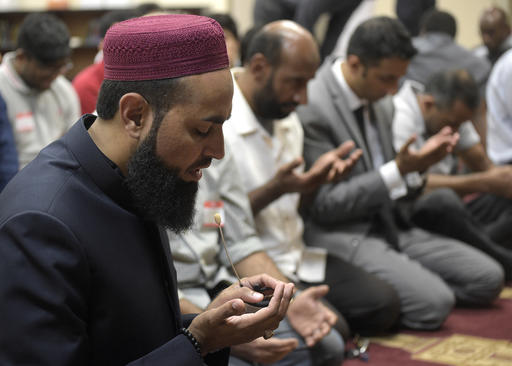
Jun 17, 2016 | Focolare Worldwide
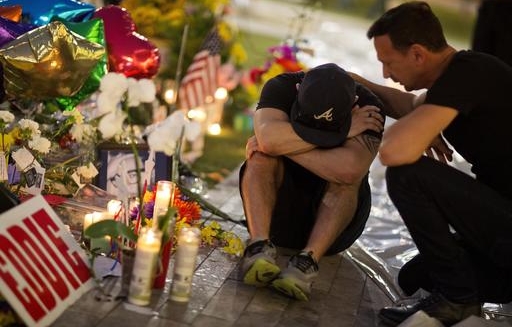 “When the telephone rang on Sunday morning, at the other end of the line was my husband’s son weeping: his friend had been among the victims of the massacre in Orlando. The tragedy had come right into our own home.” Kathie felt that the only possible response to such pain was love. She gathered the family: “We joined the 18:00 moment of silence that enveloped the city and the state, and then we went to Mass to pray that God would comfort the families, the wounded, my stepson and his friends.” Eva’s beauty parlour is only a few miles from the Pulse, and her colleagues knew several of the club’s customers. “I hadn’t turned on the TV and wasn’t particularly alarmed by the sound of sirens in the night, so I heard about the shooting at church where it was announced that one of our parishioners had been killed. They were our friends. What happened to them could have happened to me or to others around me. I asked myself if I had really done my best to love the people right beside me. Bullets had killed those young people, but I couldn’t make love die.”
“When the telephone rang on Sunday morning, at the other end of the line was my husband’s son weeping: his friend had been among the victims of the massacre in Orlando. The tragedy had come right into our own home.” Kathie felt that the only possible response to such pain was love. She gathered the family: “We joined the 18:00 moment of silence that enveloped the city and the state, and then we went to Mass to pray that God would comfort the families, the wounded, my stepson and his friends.” Eva’s beauty parlour is only a few miles from the Pulse, and her colleagues knew several of the club’s customers. “I hadn’t turned on the TV and wasn’t particularly alarmed by the sound of sirens in the night, so I heard about the shooting at church where it was announced that one of our parishioners had been killed. They were our friends. What happened to them could have happened to me or to others around me. I asked myself if I had really done my best to love the people right beside me. Bullets had killed those young people, but I couldn’t make love die.”
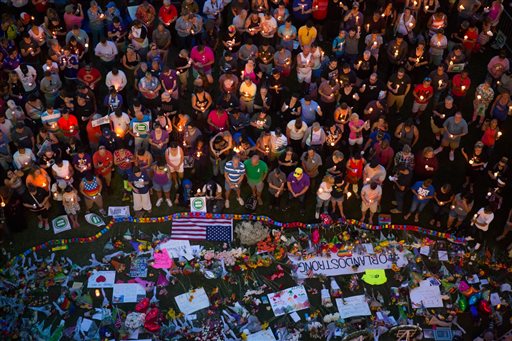
Mourners attend a candlelight vigil in Orlando
 There is a strong risk that Muslims will again be blamed of favouring great acts of violence, but the reality is altogether different, because they were the first to step up and donate blood for the many wounded and, in many cities, the night prayer during Ramadan was dedicated to the murder victims of Orlando. Sandra, Milagros and Joyce, who are less than 70 years old between them, had to admit once more that the Gospel is the only weapon that doesn’t injure others, but only one’s own egoism and pride. “It’s all so senseless what we are going through, but we can’t let ourselves be paralyzed by fear. We have to demonstrate that love, precisely because it begins small – from peace in our workplaces and with our neighbours – can change much and bring hope and forgiveness.” “On Sunday morning, when I learned of the tragic events far from my home, among people whose choices were different from mine, I thought that difference cannot divide us: They’re my brothers and sisters.” With these words Celi began her testimony, her network of prayer and communion. “The only answer to hatred and terrorism is to never stop living by this belief in love and, especially, to do it together with all the people who never stop extending God’s caress to everyone.”
There is a strong risk that Muslims will again be blamed of favouring great acts of violence, but the reality is altogether different, because they were the first to step up and donate blood for the many wounded and, in many cities, the night prayer during Ramadan was dedicated to the murder victims of Orlando. Sandra, Milagros and Joyce, who are less than 70 years old between them, had to admit once more that the Gospel is the only weapon that doesn’t injure others, but only one’s own egoism and pride. “It’s all so senseless what we are going through, but we can’t let ourselves be paralyzed by fear. We have to demonstrate that love, precisely because it begins small – from peace in our workplaces and with our neighbours – can change much and bring hope and forgiveness.” “On Sunday morning, when I learned of the tragic events far from my home, among people whose choices were different from mine, I thought that difference cannot divide us: They’re my brothers and sisters.” With these words Celi began her testimony, her network of prayer and communion. “The only answer to hatred and terrorism is to never stop living by this belief in love and, especially, to do it together with all the people who never stop extending God’s caress to everyone.”
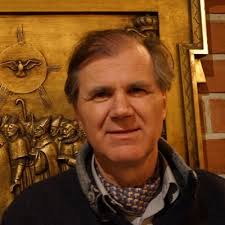
Jun 16, 2016 | Focolare Worldwide
 “Christians in Festival” was the title chosen for a large ecumenical gathering in Nizza, France where Swiss Reformed Pastor, Martin Hoegger, was invited to give his testimony on “Christ, light of my life” and on how it led him from atheism to belief. We offer some excerpts, but the complete text in French can be found on his blog. “At the age of 18 I was asking many questions about the meaning of life. I was wondering which studies I should take up. I was quite knowledgeable in philosophy and literature, but I wasn’t searching for wisdom. I also wanted to know God. I enrolled at the school of theology in Lausanne. I was drawn to the study of religion, and I imagined I would find my way in theology. But the more I went ahead the more the questions increased. Ten months later I was an atheist. One day I went into a church and posted my rebellion on the lectern: ‘God doesn’t exist!’ I decided to give my studies, but the questions continued. Sometime later I met a friend who invited me to attend a meeting in Aix-en-Provence at a Protestant school of theology. That’s where God was waiting for me. I was touched by the fraternal atmosphere that was flowing among the people at that meeting. That night I knelt down in my bedroom, and only one word came to my lips: “Sorry”. I was surprised. To whom had I spoken that word? Deep down I knew why I had said it: At that time I was in conflict with a lot of people and had offended quite a few. When I got home, I went to them to ask ‘forgiveness’. Each time was a new experience of light: I experienced Christ waiting for me in others, especially in the most disadvantaged. So I sought contact with other Christians. Up until that day I had lived life on my own. Now, I had discovered the light of the Risen Jesus that illuminates those who gather in his name. I’ll share with you three experiences on the Word that have a strong ecumenical dimension. The School of the Word: When I was director of the Swiss Bible Society, I entered in contact with Cardinal Martini, the then archbishop of Milan. He was gathering thousands of young people to experience lectio divina. Several people involved in youth ministry from the Catholic, Reformed and Evangelical Churches in Switzerland were interested in the experience. The Cardinal invited us to launch an ecumenical School of the Word. We experienced that getting together to listen to Christ unites us at a very deep level. The Word of Life as “light for my path” (Ps 119,105). The Word of Life is put out by the Focolare Movement, which I’ve been involved with for some twenty years. It’s a Bible verse that we meditate on for one month, but especially try to live in our daily lives and share the fruits with one another. I proposed it to the parishioners in the parish where I exercise my Ministry: It renewed the parish. Celebration of the Word every first Sunday of the month at the Cathedral of Lausanne. The Community of Churches from the Canton of Vaud invited the 20 churches that belong to it. Since 2004 over a hundred such celebrations have been held there. It’s been a fine ecumenical apprenticeship in which we discover our diversity and rejoice in it. It encourages us not be afraid of our differences and to give thanks for the gifts that have been accorded to others, and which never cease to enrich us. This precious initiative has been most useful in helping us to walk together as Christians towards unity. Gathering again and again in the presence of God, to listen to his Word is to already anticipate a full communion. By prayer the Holy Spirit already unites us, and that’s why Christ is light in my life.” Maria Chiara De Lorenzo Blog of Martin Hoegger Address of His Holiness Pope Francis to the World Communion of Reformed Churches
“Christians in Festival” was the title chosen for a large ecumenical gathering in Nizza, France where Swiss Reformed Pastor, Martin Hoegger, was invited to give his testimony on “Christ, light of my life” and on how it led him from atheism to belief. We offer some excerpts, but the complete text in French can be found on his blog. “At the age of 18 I was asking many questions about the meaning of life. I was wondering which studies I should take up. I was quite knowledgeable in philosophy and literature, but I wasn’t searching for wisdom. I also wanted to know God. I enrolled at the school of theology in Lausanne. I was drawn to the study of religion, and I imagined I would find my way in theology. But the more I went ahead the more the questions increased. Ten months later I was an atheist. One day I went into a church and posted my rebellion on the lectern: ‘God doesn’t exist!’ I decided to give my studies, but the questions continued. Sometime later I met a friend who invited me to attend a meeting in Aix-en-Provence at a Protestant school of theology. That’s where God was waiting for me. I was touched by the fraternal atmosphere that was flowing among the people at that meeting. That night I knelt down in my bedroom, and only one word came to my lips: “Sorry”. I was surprised. To whom had I spoken that word? Deep down I knew why I had said it: At that time I was in conflict with a lot of people and had offended quite a few. When I got home, I went to them to ask ‘forgiveness’. Each time was a new experience of light: I experienced Christ waiting for me in others, especially in the most disadvantaged. So I sought contact with other Christians. Up until that day I had lived life on my own. Now, I had discovered the light of the Risen Jesus that illuminates those who gather in his name. I’ll share with you three experiences on the Word that have a strong ecumenical dimension. The School of the Word: When I was director of the Swiss Bible Society, I entered in contact with Cardinal Martini, the then archbishop of Milan. He was gathering thousands of young people to experience lectio divina. Several people involved in youth ministry from the Catholic, Reformed and Evangelical Churches in Switzerland were interested in the experience. The Cardinal invited us to launch an ecumenical School of the Word. We experienced that getting together to listen to Christ unites us at a very deep level. The Word of Life as “light for my path” (Ps 119,105). The Word of Life is put out by the Focolare Movement, which I’ve been involved with for some twenty years. It’s a Bible verse that we meditate on for one month, but especially try to live in our daily lives and share the fruits with one another. I proposed it to the parishioners in the parish where I exercise my Ministry: It renewed the parish. Celebration of the Word every first Sunday of the month at the Cathedral of Lausanne. The Community of Churches from the Canton of Vaud invited the 20 churches that belong to it. Since 2004 over a hundred such celebrations have been held there. It’s been a fine ecumenical apprenticeship in which we discover our diversity and rejoice in it. It encourages us not be afraid of our differences and to give thanks for the gifts that have been accorded to others, and which never cease to enrich us. This precious initiative has been most useful in helping us to walk together as Christians towards unity. Gathering again and again in the presence of God, to listen to his Word is to already anticipate a full communion. By prayer the Holy Spirit already unites us, and that’s why Christ is light in my life.” Maria Chiara De Lorenzo Blog of Martin Hoegger Address of His Holiness Pope Francis to the World Communion of Reformed Churches
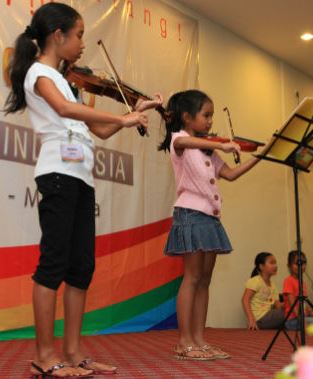
Jun 15, 2016 | Focolare Worldwide, Senza categoria
 The crisis of the refugees in Europe, along with its figures, the number of deaths, and the closed frontiers, is awaiting the world’s response, as well as that of many generous people. The news from Indonesia comes as the answer of the Youth for a United World in the city of Medan, Indonesia (four million inhabitants). “We could not turn a deaf ear to the refugees camped in Greece, and we wanted to do something concrete for them. So we decided to plan our United World Week 2016 by organizing a concert to gather funds for them. It was our way of giving strong affirmation that peace is possible and starts from each of us, with concrete actions.” “We had two weeks to prepare the event, which was not much, but we thought that we would succeed if we worked hard, forgetting our fatigue and economic difficulties. To cover the organisational expenses we sang even in restaurants. But God’s Providence came to our aid and we managed to pay for the lease of a hall, part of the sound system and other items.” “When I saw all those young people in the audience – says Ika – I tried not to think of myself but of the refugees, and took courage. “From the technical viewpoint – some confessed with great simplicity – «we made so many mistakes, but the atmosphere of enthusiasm and joy of the 350 participants convinced us that it was all worth the while!” Even a choir of four singers of a Catholic University wanted to contribute to the peace concert.” “The proceeds of € 600 correspond to three or four months’ basic salary in Indonesia, which is not much, but we were so happy that we managed to give our drop of help for our brethren in difficulty.” “It was an extraordinary experience – stressed Randi – I strongly felt that the differences in religions and ethnic groups are in reality very meaningful. I hope that many hearts have been touched and start loving with concrete gestures.” “On a wall poster entitled “Let’s bridge,” the participants signed up with their commitment to build peace.”
The crisis of the refugees in Europe, along with its figures, the number of deaths, and the closed frontiers, is awaiting the world’s response, as well as that of many generous people. The news from Indonesia comes as the answer of the Youth for a United World in the city of Medan, Indonesia (four million inhabitants). “We could not turn a deaf ear to the refugees camped in Greece, and we wanted to do something concrete for them. So we decided to plan our United World Week 2016 by organizing a concert to gather funds for them. It was our way of giving strong affirmation that peace is possible and starts from each of us, with concrete actions.” “We had two weeks to prepare the event, which was not much, but we thought that we would succeed if we worked hard, forgetting our fatigue and economic difficulties. To cover the organisational expenses we sang even in restaurants. But God’s Providence came to our aid and we managed to pay for the lease of a hall, part of the sound system and other items.” “When I saw all those young people in the audience – says Ika – I tried not to think of myself but of the refugees, and took courage. “From the technical viewpoint – some confessed with great simplicity – «we made so many mistakes, but the atmosphere of enthusiasm and joy of the 350 participants convinced us that it was all worth the while!” Even a choir of four singers of a Catholic University wanted to contribute to the peace concert.” “The proceeds of € 600 correspond to three or four months’ basic salary in Indonesia, which is not much, but we were so happy that we managed to give our drop of help for our brethren in difficulty.” “It was an extraordinary experience – stressed Randi – I strongly felt that the differences in religions and ethnic groups are in reality very meaningful. I hope that many hearts have been touched and start loving with concrete gestures.” “On a wall poster entitled “Let’s bridge,” the participants signed up with their commitment to build peace.”
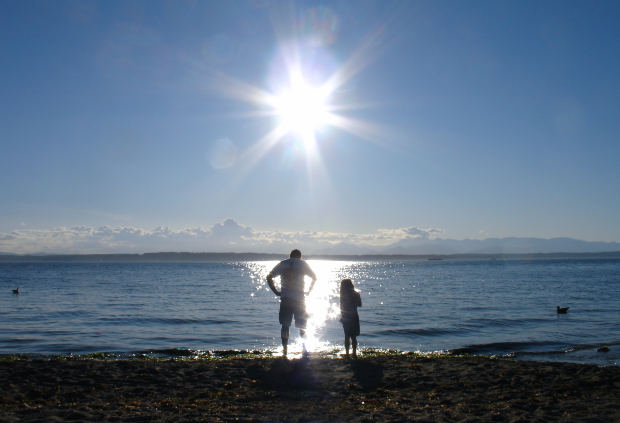
Jun 14, 2016 | Focolare Worldwide
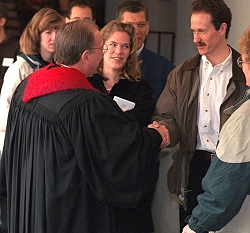 Pastor of Mercy “To begin the Year of Mercy with a concrete gesture, I asked forgiveness of the members of my parish in case they didn’t always feel loved by me, and I invited them – those who wanted to – to come up and shake hands with me as a sign of our agreement to see each other with new eyes. A long queue was formed, and I was able to exchange a few words with every person. The next day, a parishioner who had not been there came to ask me if I would repeat the gesture because it had touched so many people in the village that it was still having lots of consequences.” (I. S. Hungary) Sharing “I’m nearly blind. The person who helps me to study had given me 1.220 shillings to buy the medicine against malaria. On the way to the pharmacy I met a poor woman who told me about her need. To help out, I gave her 200 shillings. Shortly afterwards, in front of the pharmacy I met another woman who was in dire financial straits: She didn’t have the money to buy the medicine that was necessary for her. I saw Jesus in her as well. So another 200 shillings went to her. But now I was short 400 shillings for my own medicine. Certain that God wouldn’t fail to help me in my need, I went into the pharmacy just the same. Inside I met a friend whom I hadn’t seen in a long time. I shared my need with him and he insisted on giving me 500 shillings: more than what I needed.” (R. S. Tanzania) At the Public Washhouse “Many of us were washing clothes at the public washhouse when a blind man arrived with two bed linens, a shirt and a turban that needed to be washed. I asked that we make room for him. Since no one wanted to move, I turned to him and said: “Baba, give me your things. I’ll wash them.” The others began to laugh. Before going away, pleased with the washing I had done, he gave me his blessing and also a small piece of soap that he had been jealously guarding. No one laughed anymore; on the contrary, they had begun to lend things to each other and offer help to one another.” (F. R. – Pakistan)
Pastor of Mercy “To begin the Year of Mercy with a concrete gesture, I asked forgiveness of the members of my parish in case they didn’t always feel loved by me, and I invited them – those who wanted to – to come up and shake hands with me as a sign of our agreement to see each other with new eyes. A long queue was formed, and I was able to exchange a few words with every person. The next day, a parishioner who had not been there came to ask me if I would repeat the gesture because it had touched so many people in the village that it was still having lots of consequences.” (I. S. Hungary) Sharing “I’m nearly blind. The person who helps me to study had given me 1.220 shillings to buy the medicine against malaria. On the way to the pharmacy I met a poor woman who told me about her need. To help out, I gave her 200 shillings. Shortly afterwards, in front of the pharmacy I met another woman who was in dire financial straits: She didn’t have the money to buy the medicine that was necessary for her. I saw Jesus in her as well. So another 200 shillings went to her. But now I was short 400 shillings for my own medicine. Certain that God wouldn’t fail to help me in my need, I went into the pharmacy just the same. Inside I met a friend whom I hadn’t seen in a long time. I shared my need with him and he insisted on giving me 500 shillings: more than what I needed.” (R. S. Tanzania) At the Public Washhouse “Many of us were washing clothes at the public washhouse when a blind man arrived with two bed linens, a shirt and a turban that needed to be washed. I asked that we make room for him. Since no one wanted to move, I turned to him and said: “Baba, give me your things. I’ll wash them.” The others began to laugh. Before going away, pleased with the washing I had done, he gave me his blessing and also a small piece of soap that he had been jealously guarding. No one laughed anymore; on the contrary, they had begun to lend things to each other and offer help to one another.” (F. R. – Pakistan)  Failed divorce “It wasn’t easy to make Susanna accept my decision to ask for a divorce, especially because I intended to move to another city with the woman I had begun a new relationship with. After the initial refusal my wife’s attitude changed. I was shocked by her great dignity and didn’t understand where she was getting the energy to treat me so well in spite of my betrayal. This thought took away my peace. One day I invited her out for lunch at a restaurant: I wanted to know. With simplicity she confided to me that she had discovered God’s love through a group of several Christian friends she had met. God always loves us despite our infidelities, and He’s close to us in the hardships of life. That’s all it took to make me change my idea. Susanna and I had begun again.” (L. M. USA)
Failed divorce “It wasn’t easy to make Susanna accept my decision to ask for a divorce, especially because I intended to move to another city with the woman I had begun a new relationship with. After the initial refusal my wife’s attitude changed. I was shocked by her great dignity and didn’t understand where she was getting the energy to treat me so well in spite of my betrayal. This thought took away my peace. One day I invited her out for lunch at a restaurant: I wanted to know. With simplicity she confided to me that she had discovered God’s love through a group of several Christian friends she had met. God always loves us despite our infidelities, and He’s close to us in the hardships of life. That’s all it took to make me change my idea. Susanna and I had begun again.” (L. M. USA)
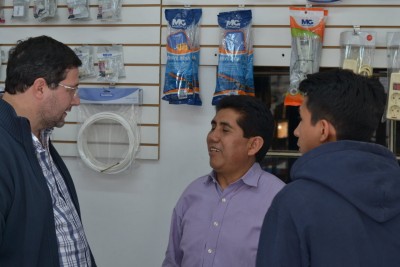
Jun 13, 2016 | Focolare Worldwide
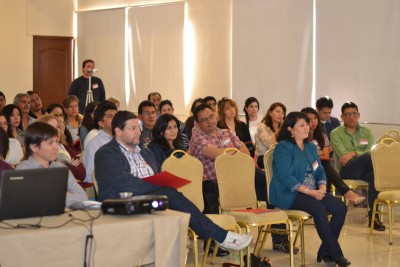 “Cochabamba is really the heart of the country, the fourth largest city of Bolivia, located in a fertile valley surrounded by the Andes Mountains. The journey is already preparing me to overcome my own personal mountains and take the leap of leaving behind my culture, presumptions and prejudices so that I can be sufficiently disposed to grasp the beauty of this experience where each of us wishes to be a gift for the other.” “On the morning of the 26th we visit the Old City, which has a traditional air about it and conserves many colonial images that can be found in the numerous temples and in the large villas. In the afternoon we visit the Universidad Católica Boliviana San Pablo for a meeting with 70 young people from different departments. Discussions of theory follow experiences that are preceded by a group exercise by Aldo Calliera who invites us to find our true north because – he says – the world has lost its compass. For us in the Economy of Communion, our north is the other person.” The 1st Conference for EoC business owners began on May 27th and I was fortunate to attend, watching and listening so that I could tell about the extraordinary event that was made up of the stories of many businesses that, day in, day out are putting their money on communion.” In his welcome speech Argentinian business owner, Ramón Cerviño, reminds us that we’ve come for an experience of communion, because communion is the true wealth of the EoC.” “The programme takes us to the very roots of the charism of unity to rediscover the origins of the EoC.
“Cochabamba is really the heart of the country, the fourth largest city of Bolivia, located in a fertile valley surrounded by the Andes Mountains. The journey is already preparing me to overcome my own personal mountains and take the leap of leaving behind my culture, presumptions and prejudices so that I can be sufficiently disposed to grasp the beauty of this experience where each of us wishes to be a gift for the other.” “On the morning of the 26th we visit the Old City, which has a traditional air about it and conserves many colonial images that can be found in the numerous temples and in the large villas. In the afternoon we visit the Universidad Católica Boliviana San Pablo for a meeting with 70 young people from different departments. Discussions of theory follow experiences that are preceded by a group exercise by Aldo Calliera who invites us to find our true north because – he says – the world has lost its compass. For us in the Economy of Communion, our north is the other person.” The 1st Conference for EoC business owners began on May 27th and I was fortunate to attend, watching and listening so that I could tell about the extraordinary event that was made up of the stories of many businesses that, day in, day out are putting their money on communion.” In his welcome speech Argentinian business owner, Ramón Cerviño, reminds us that we’ve come for an experience of communion, because communion is the true wealth of the EoC.” “The programme takes us to the very roots of the charism of unity to rediscover the origins of the EoC.  Thus, we go to visit the Centro Rincón de Luz, a social project that offers academic support to children living in a very poor quarter. Their families don’t always manage to assist them in their school work. They live in small huts of one or two rooms, often under-nourished and even beaten . . . Maricruz, who is now one of the directors, was once herself one of those children. Solidarity begets more solidarity. The virtuous circle of reciprocity is key to responding to such concrete social problems.” “We also visit the Casa de los Niños. Chiara Lubich had once shared that she wished that one day all orphanages could be closed and every child enjoy the warmth and love of a family. Many people like Arístides began to follow her dream and got to work wherever and however they could, providing temporary lodging and support for the families of those children who suffer the greatest abandonment, the ones afflicted with AIDS. In the recent years, with the help of others, they’ve been able to offer dignified lodging to a hundred families. In spite of the suffering of those families, many of them HIV positive, the beauty of the little village shows that it’s possible to embrace innocent suffering and fill it with joy, games, flowers and a spirit of hope.” “In the meeting among Mexican, Paraguayan, Argentinian and Bolivian business owners we share our dreams, failures and successes. A special meeting is held on May 28th at the Gran Hotel Cochabamba, with 120 people including business owners, students, experts, officials and people interested in knowing more about a new culture for the economy. Sunday, May 29th is a day of feasting: It’s the 25th anniversary of the Economy of Communion! There is singing, dancing, local foods and much sharing.” “Thank you Bolivia for having helped me to rediscover my true north where Heaven and earth seem to mingle.” Source: Website Cono Sur
Thus, we go to visit the Centro Rincón de Luz, a social project that offers academic support to children living in a very poor quarter. Their families don’t always manage to assist them in their school work. They live in small huts of one or two rooms, often under-nourished and even beaten . . . Maricruz, who is now one of the directors, was once herself one of those children. Solidarity begets more solidarity. The virtuous circle of reciprocity is key to responding to such concrete social problems.” “We also visit the Casa de los Niños. Chiara Lubich had once shared that she wished that one day all orphanages could be closed and every child enjoy the warmth and love of a family. Many people like Arístides began to follow her dream and got to work wherever and however they could, providing temporary lodging and support for the families of those children who suffer the greatest abandonment, the ones afflicted with AIDS. In the recent years, with the help of others, they’ve been able to offer dignified lodging to a hundred families. In spite of the suffering of those families, many of them HIV positive, the beauty of the little village shows that it’s possible to embrace innocent suffering and fill it with joy, games, flowers and a spirit of hope.” “In the meeting among Mexican, Paraguayan, Argentinian and Bolivian business owners we share our dreams, failures and successes. A special meeting is held on May 28th at the Gran Hotel Cochabamba, with 120 people including business owners, students, experts, officials and people interested in knowing more about a new culture for the economy. Sunday, May 29th is a day of feasting: It’s the 25th anniversary of the Economy of Communion! There is singing, dancing, local foods and much sharing.” “Thank you Bolivia for having helped me to rediscover my true north where Heaven and earth seem to mingle.” Source: Website Cono Sur

 “On my way home,” recounts Ofelia who is from a small district of Valencia, the third largest city of Venezuela, “I saw a couple going home on foot. I slowed down and asked if they wanted a ride. Exhausted and breathless, they got into the car immediately. After getting their breath back they told me that they had awoken very early to go and buy flour and other basic foodstuffs for their kids, but the queue was so long that when their turn came, there was nothing left. Disappointed, they told themselves that the only thing they would return home with was a big headache since they had not had breakfast or lunch.” These painful and unfortunately recurring situations often go unanswered since even Ofelia had nothing to give them. Her purse was empty and she was jobless. The widespread lack of means of livelihood pushed the Focolare community in Venezuela to help one another in all ways. For example, the ladies offer one another hairstyling services and mend old clothes to give to those in need, so as to be neat and orderly despite their poverty, and testify also visibly to the evangelical love they try to live amongst them. “One day,” the head of a family recounted, “I went to buy some food, but there was nothing available and it seemed like everything had disappeared. On doing our rounds I spotted some foruro or toasted maize. We generally do not eat this, but we recalled that one of our friend’s family ate it, and I thought that it was better than nothing. In the afternoon, passing by their home, I dropped by to ask whether they had eaten lunch. The wife said “no, not even breakfast. We have no money and my husband has weakened due to hunger.” I told her that they couldn’t go to bed without eating something, and ran to take the foruro I had bought. That evening for me was really joyful since they were able to have dinner, even if only with just foruro. One day, Laura was stopped by a woman who confided her worries since she could not find the medicine for her hypertension. She herself instead managed to get the drugs through acquaintances from abroad. In times like this, it would be prudent to keep these items for oneself, also because you never know whether you will be able to procure them again. But in the Gospel Jesus said «give and you will receive, and without thinking twice, opened her bag and gave her a whole blister pack of pills.
“On my way home,” recounts Ofelia who is from a small district of Valencia, the third largest city of Venezuela, “I saw a couple going home on foot. I slowed down and asked if they wanted a ride. Exhausted and breathless, they got into the car immediately. After getting their breath back they told me that they had awoken very early to go and buy flour and other basic foodstuffs for their kids, but the queue was so long that when their turn came, there was nothing left. Disappointed, they told themselves that the only thing they would return home with was a big headache since they had not had breakfast or lunch.” These painful and unfortunately recurring situations often go unanswered since even Ofelia had nothing to give them. Her purse was empty and she was jobless. The widespread lack of means of livelihood pushed the Focolare community in Venezuela to help one another in all ways. For example, the ladies offer one another hairstyling services and mend old clothes to give to those in need, so as to be neat and orderly despite their poverty, and testify also visibly to the evangelical love they try to live amongst them. “One day,” the head of a family recounted, “I went to buy some food, but there was nothing available and it seemed like everything had disappeared. On doing our rounds I spotted some foruro or toasted maize. We generally do not eat this, but we recalled that one of our friend’s family ate it, and I thought that it was better than nothing. In the afternoon, passing by their home, I dropped by to ask whether they had eaten lunch. The wife said “no, not even breakfast. We have no money and my husband has weakened due to hunger.” I told her that they couldn’t go to bed without eating something, and ran to take the foruro I had bought. That evening for me was really joyful since they were able to have dinner, even if only with just foruro. One day, Laura was stopped by a woman who confided her worries since she could not find the medicine for her hypertension. She herself instead managed to get the drugs through acquaintances from abroad. In times like this, it would be prudent to keep these items for oneself, also because you never know whether you will be able to procure them again. But in the Gospel Jesus said «give and you will receive, and without thinking twice, opened her bag and gave her a whole blister pack of pills.  In this country’s difficult situation, the visit of Cecilia di Lascio (21-25 May) Argentinean, and regional coordinator of the Political Movement for Unity, was really timely. In Caracas, she had an interesting meeting with 75 people who wanted to commit themselves for the common good, and among whom were various young people: in the hall of the National Assembly she presented the ideal of unity to a group of people who were interested in politics, and before leaving the country held a meeting with a group of university professors on how to educate the youth according to the paradigm of fraternity in the various disciplines of knowledge and human activities. Two important events were also held in the encounter with Dr. Lombardi, of the Cecilio Acosta University, and a meeting with the RUEF (University network of studies on Fraternity) commission. All this contributed to acquiring greater comprehension of the political process taking place in the country. “We have to focus on equity, the central objective and start off from the paradigm of fraternity,” Dr Lascio affirmed in her various speeches. “In this difficult situation I firmly believe in the importance of working together for the common good.”
In this country’s difficult situation, the visit of Cecilia di Lascio (21-25 May) Argentinean, and regional coordinator of the Political Movement for Unity, was really timely. In Caracas, she had an interesting meeting with 75 people who wanted to commit themselves for the common good, and among whom were various young people: in the hall of the National Assembly she presented the ideal of unity to a group of people who were interested in politics, and before leaving the country held a meeting with a group of university professors on how to educate the youth according to the paradigm of fraternity in the various disciplines of knowledge and human activities. Two important events were also held in the encounter with Dr. Lombardi, of the Cecilio Acosta University, and a meeting with the RUEF (University network of studies on Fraternity) commission. All this contributed to acquiring greater comprehension of the political process taking place in the country. “We have to focus on equity, the central objective and start off from the paradigm of fraternity,” Dr Lascio affirmed in her various speeches. “In this difficult situation I firmly believe in the importance of working together for the common good.”






 Pastor of Mercy “To begin the Year of Mercy with a concrete gesture, I asked forgiveness of the members of my parish in case they didn’t always feel loved by me, and I invited them – those who wanted to – to come up and shake hands with me as a sign of our agreement to see each other with new eyes. A long queue was formed, and I was able to exchange a few words with every person. The next day, a parishioner who had not been there came to ask me if I would repeat the gesture because it had touched so many people in the village that it was still having lots of consequences.” (I. S.
Pastor of Mercy “To begin the Year of Mercy with a concrete gesture, I asked forgiveness of the members of my parish in case they didn’t always feel loved by me, and I invited them – those who wanted to – to come up and shake hands with me as a sign of our agreement to see each other with new eyes. A long queue was formed, and I was able to exchange a few words with every person. The next day, a parishioner who had not been there came to ask me if I would repeat the gesture because it had touched so many people in the village that it was still having lots of consequences.” (I. S. 
 “Cochabamba is really the heart of the country, the fourth largest city of
“Cochabamba is really the heart of the country, the fourth largest city of